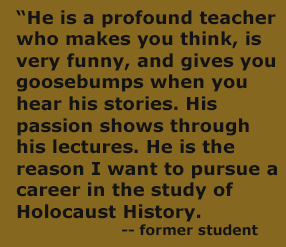Gary Bruce: Learning on Location
 |
|
Gary Bruce, Department of History |
Written by Sarah Forbes, Special Projects (Teaching Stories), CTE.
When a group of dedicated students from his German history courses approached Dr. Gary Bruce in 2010 to ask him to take them to Germany, he didn’t balk at the challenge. Instead, he organized a 10-day trip that could be taken as a class for credit, and brought his first group of students overseas. In Germany, he showed them not only historical monuments, but monumental people as well. It became the trip of a lifetime for students, allowing them to experience historical places alongside a professor who has studied German history for more than two decades.

When Bruce started teaching, he didn’t plan to develop a unique travel course. However, he finds that bringing his students overseas allows them to engage in deeper learning as they integrate concepts of memory, history, and culture into one assignment. "They really leave the trip with the understanding that memory is not objective," says Bruce. Instead, he says, it’s political: the way we choose to memorialise events such as the Holocaust reveals something about our current culture. In order to allow them to experience this for themselves, they’re given the opportunity to meet a former Stasi officer with a wildly different perspective on East Germany and modern-day Germany. "Meeting him de-centers Canada," Bruce explains. As the Stasi officer justifies the East German Weltanschauung and criticizes the current Western system, it illustrates the gray area between the two political ideas.
In preparation for the travel course, students attend seminars and read material pertaining to the history and culture of Germany. Since they come on the trip with many different levels of knowledge, this preparation helps ensure that everyone understands the context of the experience they are about to have. When they return, students complete a project that combines academic research with their own personal experiences. Working on this project provides them with a glimpse into what it means to be a professional historian.
By treating his students as professionals, Bruce embodies his own philosophy on teaching. “I always treat each student with respect,” he says. To this end, he encourages everyone in his courses to actively participate in every aspect. Without their participation, he adds, he couldn’t teach his classes.
Asked to share his favourite teaching moment, Bruce leads with a baseball joke. “If you ask a baseball fan what the best game was, they’ll answer ‘the one that’s playing tonight.’ That’s how I feel about teaching – my favourite moment is the next time I get to teach.”
Read more Teaching Stories
More Resources
Listen to Gary Bruce discuss the role of the Berlin Zoo in German culture in this YouTube video.
CTE has developed more than 100 Teaching Tips. Each one is a succinct document that conveys useful ideas and practical methods for effective teaching. Some of the Teaching Tips that are relevant to the strategies mentioned in this Teaching Story include the following: